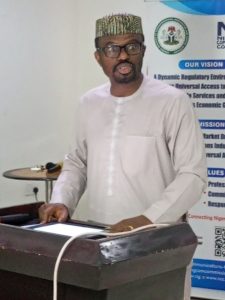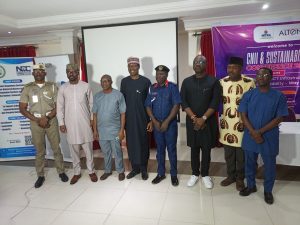NCC outlines robust plans to secure critical national infrastructure

The Nigerian Communications Commission (NCC) has outlined strategies that are being undertaken to safeguard the nation’s digital backbone, the Critical National Information Infrastructure (CNII).
These measures, designed to translate the Presidential Order on CNII into concrete action, were highlighted by the NCC’s Executive Vice Chairman, Dr. Aminu Maida, in a keynote address delivered at a recent industry conference themed “Critical National ICT Infrastructure and Industry Sustainability – Way Forward,” organized by the Nigeria Information Technology Reporters Association (NITRA) and the Association of Licensed Telecom Operators of Nigeria (ALTON) in Lagos.
In his address, NCC’s Executive Vice Chairman, Dr. Aminu Maida, represented by Edoyemi Ogoh, Director of the Technical Standards and Network Integrity Department, emphasized that the NCC, as the primary telecommunications regulator, is taking a proactive, multi-pronged approach to protect vital digital infrastructure— not just for economic development but also for national security, digital sovereignty, and societal resilience.
He highlighted that the telecommunications is the bedrock of Nigeria’s digital economy as the industry contributes over 14.4% (Q4, 2024) to Nigeria’s GDP and underpins nearly all critical sectors — from banking, energy, and health to security, education, governance and the enabling platform for innovation, productivity, and growth.
According to him, at the heart of this ecosystem is the need for reliable, secure, and resilient infrastructure. Telecom towers, fibre optic networks, data centres, IXPs, and international gateways constitute the digital lifelines of our economy, noting that disruption to these assets could paralyse vital services — including emergency communications, financial transactions, and government operations.
He stated further that it is for this reason that our telecommunications infrastructure has rightly been designated as Critical National Information Infrastructure (CNII) by President Bola Ahmed Tinubu (GCFR) pursuant to Section 3 of the Cybersecurity Act.
He affirmed that this designation comes with heightened responsibilities, not just for regulators and government, but for all stakeholders — operators, service providers, civil society, and citizens alike.
He harped on the need to continue to balance the interests of all players — consumers, service providers and government — through proactive regulatory measures, some of these include: “The Right of Way (RoW) Harmonisation Initiative in partnership with the Federal and State Governments; Continued focus and drive to improve of quality-of-service delivery; Constitution of CNII Industry Working Group — a multi-stakeholder group aimed at enabling an industry led approach in driving collaborative efforts for the protection of CNII; Regular industry stakeholder engagements through fora like this to align policy with practice; as well as improved transparency in both the activities of the Commission and improved data availability to stakeholders.
The EVC NCC emphasized that “First, the Commission has reinforced and is strictly enforcing compliance with technical standards for the deployment and maintenance of telecommunications infrastructure. Operators are now required to meet established benchmarks for the laying of fibre-optic cables, erection of towers and masts, and routine maintenance of their sites. This ensures not only the structural integrity of our networks but also the security and resilience of the national backbone.
“Second, we have launched a comprehensive public awareness campaign to build societal understanding of the CNII designation and the implications of infrastructure sabotage. Delivered through radio jingles, social media, and other multimedia channels, the campaign aims to educate the public on how disruptions — whether due to vandalism, construction accidents, or negligence — directly affect the quality of service, emergency communications, and everyday digital services relied upon by millions of Nigerians. Public buy-in is essential, and we are committed to ensuring that telecom infrastructure is viewed as a national asset deserving of collective protection.
“Third, and perhaps most importantly, we are advancing stakeholder collaboration as a cornerstone of CNII protection. The Presidential Order is not self-executing. Its success depends on the awareness, participation, and cooperation of all key actors —including lawmakers, law enforcement, the judiciary, state governments, and private sector operators. In this regard, the Commission has hosted a series of high-level stakeholder engagements with the National Assembly, the Judiciary, and most recently, with State Attorneys-General. In addition, the Commission is driving at instituting Memorandum of Understanding with key stakeholders in the telecom infrastructure ecosystem like the federal ministry of works. These forums and MOU initiatives have served as platforms to clarify roles and responsibilities under the CNII Order and to underscore the urgency of defending our telecommunications infrastructure from all forms of disruption.
“Moreover, the NCC is working in close coordination with the Office of the National Security Adviser (ONSA), which has the statutory mandate to oversee the operationalisation of the CNII framework. This collaboration ensures alignment between regulatory enforcement and national security strategy, particularly in intelligence sharing, risk classification, and response coordination.
“Fourth, the Commission has institutionalised mediation as a proactive dispute resolution mechanism. In instances where operators face administrative hurdles or community resistance during infrastructure roll-out, the NCC actively intervenes to facilitate consensus. This approach has yielded measurable outcomes — notably in Osun and Kogi States, where previously stalled infrastructure deployments have resumed following regulatory mediation. This reinforces our belief that engagement, not litigation, is often the more sustainable path to resolving industry friction points.
“Finally, while collaboration and awareness remain our primary tools, enforcement actions are not off the table. The NCC views enforcement as a measure of last resort— one to be deployed only when all engagement and mediation avenues have been exhausted. And when we do enforce, it is with the backing and cooperation of relevant security, legal, and oversight institutions. Our goal is not to penalise, but to preserve the integrity and continuity of national communications systems.
“Together, these interventions reflect a layered approach to CNII protection — one that is preventive, participatory, and pragmatic. As threats to critical infrastructure evolve in scope and sophistication — from fibre cuts, theft of fuel and telecom equipment to cyberattacks and misinformation — our response must likewise be adaptive, inclusive, and anchored in shared responsibility.”
He acknowledged that despite the collective efforts, several critical challenges persist to Industry Sustainability and CNII plans which include: “Access denial, Vandalism, Fibre cuts and Theft: Significant causative factors for service downtime is due to denial of access to sites which prevents required site operations and maintenance tasks from being carried out. Vandalism and cuts to fibre infrastructure as well as theft of both site equipment, cables and diesel are also major challenges. So far this year for example, there is an average weekly incidence of about 1100 fibre cut, 545 access denial and 99 theft incidences.
“Power Supply Gaps: With the majority of base stations relying on diesel, the cost of operations remains high.
“Right-of-Way Bottlenecks: Multiple taxation and access delays across states continue to slow fibre rollout.
“Permits for new telecom build delays: Complex and time consuming permit process in some jurisdictions and delays of new sites permits for new site build is leading to infrastructure gaps complicating the drive in assuring service quality.
“Cyber threats, particularly as OTT and IoT usage increases;
“Security issues: The security situation in parts of the country has made the deployment, operations and maintenance communications infrastructure extremely challenging.”
He explained that addressing these issues requires not just regulatory tools, but inter-agency cooperation, legislative backing, private sector responsibility, and public awareness.
To ensure the sustainability of our communications sector and the security of CNII, he stated that the way forward must rest on five pillars:
“Public Awareness and Community Ownership: We must scale campaigns that sensitise citizens to treat communications infrastructure as national assets. Community-based surveillance programs can complement state-led enforcement. The media play a key role in this regard.
“Improved inter-stakeholder collaboration between players in the
communications industry and other critical stakeholders.
“Improved coordination via information sharing with critical stakeholders e.g. between 6 construction companies and infrastructure owners during road construction and maintenance activities.
“Streamlined and uniform acquisition and permit processes for new communications infrastructure build.
“Strengthened enforcement and deterrence mechanisms
He advocated for adequate punitive measures to be taken against culprits involved in the damage of critical infrastructure considering the impact the damages have on the socio-economic, safety and security of Nigerians.
Maida emphasized that the communications sector is not only the nervous system of our digital economy — it is now a national resilience system, hence its sustainability and security cannot be taken for granted.
Additionally, he said the cost of inaction is steep: from service disruptions and investor flight to national security vulnerabilities and economic instability and urged all stakeholders, operators, journalists, regulators, law enforcement, civil society, and government to see not just the event as a conference, but as a call to action.
In his brief remarks, the ALTON Chairman, Gbenga Adebayo urged telecom operators to adopt stronger internal safeguards, stressing that the situation where someone commits a crime in one organization and moves to another one to start at the same thing has to be checkmated through a black list system.
Adebayo also criticised the operators who failed to implement basic security measures such as perimeter fencing, locks, or surveillance systems.
He stated that the black market for telecom hardware—including batteries, generators, and cables—has emboldened saboteurs, adding that “Some of these thefts are carried out by insiders who know the system. The ease of selling stolen equipment in local markets makes it worse.”
He called for tougher law enforcement and prosecutions for those caught with stolen infrastructure.
On his part, NITRA Chairman Chike Onwuegbuchi called for the creation of a Telecom Infrastructure Protection Trust Fund, modelled after Nigeria’s security trust fund, to finance the sector’s infrastructure protection needs.
Onwuegbuchi hinted that educating host communities about the impact of vandalism is key to reducing incidents and maintaining access to critical services such as banking, communication, and emergency response.
PHOTO NEWS

